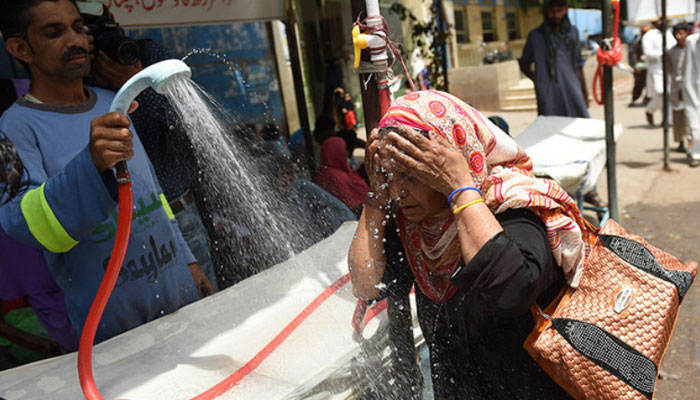Cool it, Pakistan
Tiny, portable refrigeration air-conditioners keep people cool with only 80-150 watts per person
Is anyone wondering how any Pakistani government can lead the country out of our current economic morass, whether led by the current favoured coalition or a future alternative?
Can I suggest some unconventional thinking about climate? Not the political climate, the real one – the one that’s inexorably warming, year by year.
Andrew Kamarck was probably not the first to notice that most hot countries are poorer than colder ones. He wrote about the influence of rainfall and climate variability, heat on human physiology, agricultural pests, minerals, and disease prevalence and distribution. He questioned the priorities of nearly all development economists who seemed blind to geography. Of course, some of these challenges have been overcome with the help of biological scientists.
A quarter century later, David Landes wrote with an American exceptionalist lens and attributed much of the poverty across the Global South to corrupt and selfish rulers. While arguing that poverty is best addressed from within, he still acknowledged the influence of geography and climate early in the piece.
Just a year later, the Nobel Prize winning economist Jeffrey Sachs and his colleagues delivered emphatic support for the overwhelming influence of climate and geography. GDP per capita declines 18 times with high temperatures and greater distance from the nearest ocean. Oceans moderate extreme heat, and also provide low-cost long-distance transport essential for trade.
It’s pretty obvious that we all have to slow down in the heat. Any movement, even thinking, burns sugars in our bodies and it gets much harder to lose the waste heat above 27 Celsius in moderate to high humidity.
Less obvious but far more pernicious is sleep loss. Our measurements this summer show that most people living in towns and cities struggle to sleep in summer because the temperature in sleeping quarters remains well above 30 Celsius nearly all the time. That’s the upper human limit for sleep – with a fan (without a fan it is 27 Celsius). At higher temperatures, metabolic heat raises the core temperature and prevents sleep.
It wasn’t always like this.
Urban areas have hard and heat-retaining materials that replaced shade trees and cooler vegetation. Vehicles, machines and, of course, traditional air-conditioners add to this urban heating. At night it is typically 10 Celsius hotter than the surrounding farmland or jungle, even in villages. In isolated farm compounds, night temperatures are low enough for comfort except in the fiercest heatwaves.
You can understand why development economists shy away from climate evidence. What can they do about it? Creative policymaking can’t do much to change temperature or geography.
Perhaps. But engineers can do a lot.
Air-conditioning has transformed America, Singapore and many other countries. It has made life comfortable for Pakistan elites. Yet their power consumption accounts for more than half Pakistan’s electricity.
Now a new generation of air-conditioning is appearing, with 80–90 per centless energy consumption. Tiny, portable refrigeration air-conditioners keep people cool with only 80-150 watts per person.
Coupled with solar panels and modest batteries, air-conditioned comfort could be a reality for everyone in Pakistan.
Governments can’t bring this technology to Pakistan. However, private companies can, and government could accelerate that shift with modest policy adjustments. This change could solve much of Pakistan’s energy problem and clear the way for large productivity improvements because everyone can sleep comfortably at night.
The writer is the inventor of the Coolzy portable air-conditioner.
-
 All You Need To Know Guide To Rosacea
All You Need To Know Guide To Rosacea -
 Princess Diana's Brother 'handed Over' Althorp House To Marion And Her Family
Princess Diana's Brother 'handed Over' Althorp House To Marion And Her Family -
 Trump Mobile T1 Phone Resurfaces With New Specs, Higher Price
Trump Mobile T1 Phone Resurfaces With New Specs, Higher Price -
 Factory Explosion In North China Leaves Eight Dead
Factory Explosion In North China Leaves Eight Dead -
 Blac Chyna Opens Up About Her Kids: ‘Disturb Their Inner Child'
Blac Chyna Opens Up About Her Kids: ‘Disturb Their Inner Child' -
 Winter Olympics 2026: Milan Protestors Rally Against The Games As Environmentally, Economically ‘unsustainable’
Winter Olympics 2026: Milan Protestors Rally Against The Games As Environmentally, Economically ‘unsustainable’ -
 How Long Is The Super Bowl? Average Game Time And Halftime Show Explained
How Long Is The Super Bowl? Average Game Time And Halftime Show Explained -
 Natasha Bure Makes Stunning Confession About Her Marriage To Bradley Steven Perry
Natasha Bure Makes Stunning Confession About Her Marriage To Bradley Steven Perry -
 ChatGPT Caricature Prompts Are Going Viral. Here’s List You Must Try
ChatGPT Caricature Prompts Are Going Viral. Here’s List You Must Try -
 James Pearce Jr. Arrested In Florida After Alleged Domestic Dispute, Falcons Respond
James Pearce Jr. Arrested In Florida After Alleged Domestic Dispute, Falcons Respond -
 Cavaliers Vs Kings: James Harden Shines Late In Cleveland Debut Win
Cavaliers Vs Kings: James Harden Shines Late In Cleveland Debut Win -
 2026 Winter Olympics Snowboarding: Su Yiming Wins Bronze And Completes Medal Set
2026 Winter Olympics Snowboarding: Su Yiming Wins Bronze And Completes Medal Set -
 Trump Hosts Honduran President Nasry Asfura At Mar-a-Lago To Discuss Trade, Security
Trump Hosts Honduran President Nasry Asfura At Mar-a-Lago To Discuss Trade, Security -
 Cuba-Canada Travel Advisory Raises Concerns As Visitor Numbers Decline
Cuba-Canada Travel Advisory Raises Concerns As Visitor Numbers Decline -
 Anthropic Buys 'Super Bowl' Ads To Slam OpenAI’s ChatGPT Ad Strategy
Anthropic Buys 'Super Bowl' Ads To Slam OpenAI’s ChatGPT Ad Strategy -
 Prevent Cancer With These Simple Lifestyle Changes
Prevent Cancer With These Simple Lifestyle Changes




